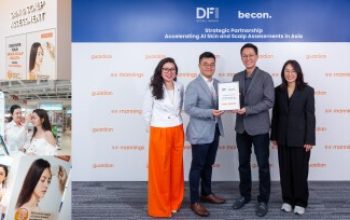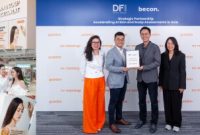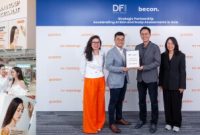Research is most comprehensive mapping to date of parenting and early childhood programmes across China, Singapore, Indonesia and the Philippines
SINGAPORE – 6 July 2023 – Asia Philanthropy Circle (APC) has today released the results of its Regional Early Childhood Development (ECD) Landscape Study. The study is the first of its kind and is the most comprehensive mapping to date of parenting and early childhood programmes across Asia, with a particular focus on China, Singapore, Indonesia and the Philippines.
The study was conducted by the Centre for Evidence and Implementation (CEI) and supported by Tanoto Foundation and other APC members and philanthropists in the region.
The findings of the study show that across all four countries, there has been a clear increase in government commitment to provide holistic support to children, families, and communities. This is evidenced by existing policies and legislation, as well as significant investments into healthcare and early education. However, the study also indicates that, while national policies exist, there are significant challenges to their local implementation, including the lack of sustainable financing, capacity, and knowledge in the sector, as well as other socio-economic and cultural barriers.
“Early childhood is a crucial time for development that will have far-reaching impacts later in life. We wanted to fund this research to better understand the needs of ECD systems in these countries. The objectives of this research are aligned with our own efforts to catalyse support for initiatives that promote quality early childhood development across the region,” said Belinda Tanoto, Member of the Board of Trustees, Tanoto Foundation.
Tanoto Foundation, which was founded in 1981 by Sukanto Tanoto, was the first organisation to approach APC to propose a regional study to better understand the gaps and identify potential areas for collaboration in the ECD area.
“Philanthropists across the region, including many of APC’s members, are already doing so much work around early childhood, but understanding the landscape enables everyone to be more strategic in their programming,” said Stacey Choe, Chief Operating Officer, Asia Philanthropy Circle. “This research helps the philanthropy sector drill down on what’s not being addressed, and find areas where we can work together to create greater impact.”
Part of the study’s aim is to guide donors, service providers, government agencies, and other key stakeholders towards these gaps that require further intervention, and to provide recommendations where sectors could collaborate to strengthen and improve outcomes in the region.
“Without a clear understanding of the current situation across a country or region, stakeholders often work in fragmented or disjointed ways, doubling efforts or investing in programmes that do not best meet the needs of the population,” said Dr. Gayatri Kembhavi-Tam, Associate Director, CEI, who led the study.
Early childhood development lays the foundation for a child’s physical, emotional, and intellectual well-being, and is a strong predictor of long-term development. Recent evidence shows that giving children the best start in life requires access to comprehensive programmes and services between birth and six years that address their health and developmental needs, including early education. Some of the common gaps across the region that have emerged that require further attention include:
- Paradoxical “double burden” of malnutrition and obesity. Malnutrition and stunting cases in Indonesia and the Philippines are still high, while there is a rise in number of overweight and obese children across all four countries. This points to a potential lack of access to information for caregivers on the right nutrition and healthy food.
- Inequity in access to health services for some populations, due to financial restrictions, or availability of services such as for rural areas, and the shortage of trained professionals.
- Lack of attention on the home learning environment, and to the role of fathers. Both factors have critical impact on ECD.
- Lack of capacity in the ECD sector. There is a need to train, retain, and recognise those in the ECD workforce -such as healthcare providers, teachers, and social workers – in order to improve the quality of services and support they can provide to families.
- Lack of reliable, national-level data and research to support evidence-based decision-making. There is a need to support and recognise research and data collection to better understand community needs, what programmes are working, in order to make better policies and decisions.
- Lack of coordination among actors. There is a need to convene policymakers, NGOs, funders, service providers and community members to improve implementation of policies and initiatives.
The study, which took place over the course of a year in 2022, examined a total of 276 programmes, 145 national and sub-national policies related to ECD across all four countries. In addition, CEI also interviewed 52 stakeholders from government, academia, and non-governmental and philanthropic organizations.
The study is the product of a joint regional collaboration led by APC in partnership with CEI and the Centre for Holistic Initiatives for Learning and Development (CHILD), and supported by 11 APC members and philanthropic organisations across the region, including Tanoto Foundation, the Ayala Foundation (Philippines), Bakti Barito Foundation (Indonesia), Djarum Foundation (Indonesia), Knowledge Channel Foundation (Philippines), IshK Tolaram Foundation (Indonesia), Li Foundation (Singapore), Nomura (Singapore), Quantedge Advancement Initiative (Singapore), Ramon Aboitiz Foundation (Philippines) and Zuellig Family Foundation (Philippines).
About Tanoto Foundation:
Tanoto Foundation is an independent philanthropic organization in the field of education founded by Sukanto Tanoto and Tinah Bingei Tanoto in 1981 based on the belief that every person should have the opportunity to realize his or her full potential. Tanoto Foundation’s programs stem from the belief that quality education accelerates equal opportunity. We harness the transformative power of education to realize people’s potential and improve life through quality education from an early to productive age.
About Asia Philanthropy Circle:
Asia Philanthropy Circle (APC) is a community of philanthropists collaborating to chart a better future for Asia. Founded in 2015 by Asia-based philanthropists to encourage peer exchange, APC has grown to over 50 members across 13 markets. We are home to a diverse network of philanthropists—across generations and interests—seeking collective impact together. Our members give in financial and human capital, champion social innovation for public good, and pioneer collaborative initiatives to build the social impact ecosystem and address systemic challenges. APC is a registered charity headquartered in Singapore with roots throughout the region. www.asiaphilanthropycircle.org.
About Centre for Evidence and Implementation:
The Centre for Evidence and Implementation envisions a world where people can improve their lives through support that is equitable and effective. We are a global, for-purpose evidence intermediary and advisory organisation dedicated to using the best evidence in practice and policy to improve the lives of people facing adversity. Established in Australia in 2016, CEI is a multi-disciplinary team across five offices in London, Melbourne, Oslo, Singapore, and Sydney. We work with our partners, including policymakers, governments, practitioners, program providers, organisation leaders, and funders in four key areas of work:
- Understanding and making sense of the evidence base
- Generating evidence through trialing, testing, and evaluating policies and programs to drive more effective decisions and deliver better outcomes
- Developing methods and processes to get high quality evidence into policy and practice
- Building cultures for evidence use


















